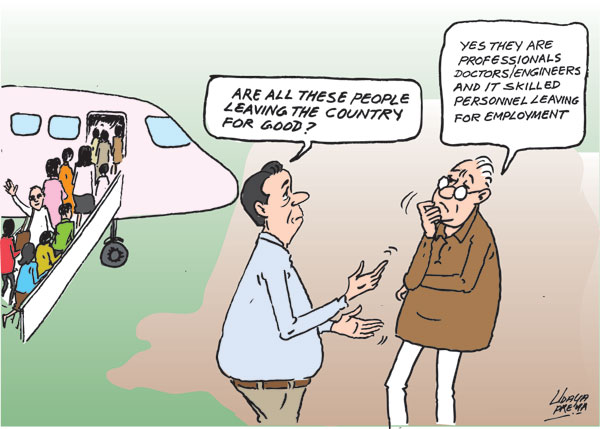Columns
Weakening of the country’s development capacity a setback to human development
View(s):Although the country is going through a period of economic stabilisation and revival, the nation’s capacity for economic development is being seriously weakened and the attainments in social development are being eroded.
Brain drain
Throughout the post-independence period, the country suffered a severe drain of skilled human resources. Perhaps the severest drain of such resources has been this year and the trend is likely to continue.
Hunan development
This exodus of academics, doctors and educated personnel is likely to reverse the admirable social achievements of the country in the past decades. Sri Lanka has been hailed as a country that had achieved much higher social development than countries that had much higher per capita incomes.
Social development
In fact, the country’s social development process began even before independence. The improvements in social development were witnessed soon after the introduction of the Donoughmore Constitution in 1931 and the introduction of the universal franchise that year.
Achievements
Sri Lanka has achieved a high literacy rate and school enrolment, low maternal, infant, and child mortality, and a life expectancy of over 75 years.
Threatened
These achievements are now threatened and the prospects of achieving the Sustainable Development Goals (SDGs) for 2025 are unlikely.
Past setbacks
The first setback to the country’s human resources came with the adoption of Sinhala as the only national language in 1956. This was a severe blow to the very important Burgher community that had contributed immensely to all economic and social activities of the country. Educated Tamils too began to migrate to other countries.
1958
Soon after, the ethnic riots of 1958 occurred.
The second wave of this exodus happened when as a consequence of the Sinhala Only policy, there was an eruption of ethnic violence. These riots in 1958 resulted in a large number of educated Tamils leaving the country.
Economic hardships
The dire economic conditions during the 1970s made many educated persons of all communities leave the country. A large number of academics and professionals left the country.
Peradeniya
The University of Peradeniya which was of the highest academic standards at the time deteriorated in a very short period owing to the exodus of some of its finest academics in the 1970s.
Many academics, doctors, engineers, accountants, and scientists migrated to developed countries.
1983 riots
The next catastrophe occurred owing to the riots of 1983 and the nearly 30-year civil war that ensued.
A very large number of skilled Tamils left the country for Canada, the United States, Australia, Europe and Britain. They form a large diaspora that is influential in the politics of those countries.
Current situation
We are now facing another situation of such an exodus of skilled persons. Once again it is not of a particular community, but of all communities. They include many skilled personnel. Scientists, doctors, engineers and information and communication technology (ICT) trained personnel, who are vital skills for the modernisation of the Sri Lankan economy and the country’s social development are migrating.
Already the country is facing severe shortages of doctors in hospitals and academics at universities.
Knowledge society
This erosion of scientific capacity comes at a stage when the world is moving towards a knowledge society. There was a potential for Sri Lanka to benefit from knowledge-based services. This is especially so with respect to information technology. India is benefiting greatly by providing its information technology services to the rest of the world. This exodus is, therefore, a severe setback to the country’s economy. We have lost a massive economic opportunity.
Lost opportunity
The economic history of Sri Lanka is one of lost opportunities and weakening economic production. The classic case of this is the damage to the country’s tea plantations. In as much as that was an instance of “killing the goose that laid the golden eggs”, there are many other instances of economic reversals.
Concluding reflection
The exodus of educated and skilled persons is a severe blow to the country’s long-term economic development and a severe threat to social development. There may be even a reversal of the country’s attainments in health and education.
Certainly, the country’s long-term capacity for economic development has been weakened. It is a severe blow to the country’s future.
While the world is moving towards a knowledge society, our educated resources are diminishing. Every effort should be made to retain educated and skilled personnel and to enhance the country’s education, especially in skills vital for economic and social development.
Buying or selling electronics has never been easier with the help of Hitad.lk! We, at Hitad.lk, hear your needs and endeavour to provide you with the perfect listings of electronics; because we have listings for nearly anything! Search for your favourite electronic items for sale on Hitad.lk today!


Leave a Reply
Post Comment